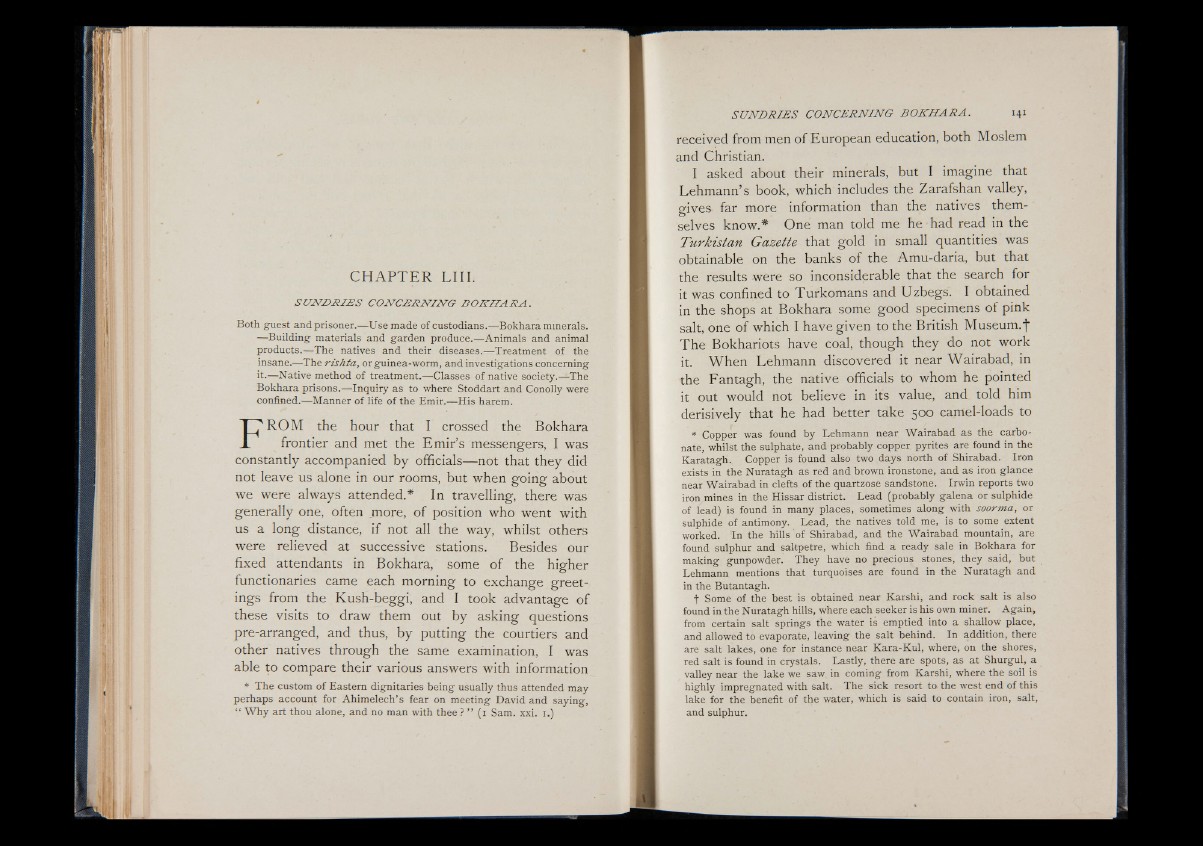
C H A P T E R L I I I .
SUNDRIES CONCERNING BO KH A R A .
Both guest and prisoner .t—Use made of custodians.— Bokhara minerals.
— Building materials and garden produce.—Animals and animal
products.—The natives and their diseases.— Treatment of the
insane.— The rishta, or guinea-worm, and investigations concerning
it.— Native method of treatment.— Classes of native society.—The
Bokhara prisons.— Inquiry as to where Stoddart and Conolly were
confinedi^-Manner of life of the Emir|g-His harem.
FROM the hour that I crossed the Bokhara
frontier and met the Emir’s messengers, I was
constantly accompanied by officials— not that they did
not leave us alone in our rooms, but when going about
we were always attended.* In travelling, there was
generally one, often jnore, of position who went with
us a long distance, if not all the way, whilst others
were relieved at successive stations. Besides our
fixed attendants in Bokhara, some o f the higher
functionaries came each morning to exchange greetings
from the Kush-beggi, and I took advantage of
these visits to draw them out by asking questions
pre-arranged, and thus, by putting the courtiers and
other natives through the same examination, I was
able to compare their various answers with information
* The custom of Eastern dignitaries being usually thus attended may
perhaps account for Ahimelech’ s fear on meeting David and saying,
“ Why art thou alone, and no man with thee ? ” (i Sam. xxi. i.)
received from men of European education, both Moslem
and Christian.
I asked about their minerals, but I imagine that
Lehmann’ s book, which includes the Zarafshan valley,
gives far more information than the natives themselves
know.* One man told me he had read in the
Turkistan Gazette that gold in small quantities was
obtainable on the banks of the Amu-daria, but that
the results were so inconsiderable that the search for
it was confined to Turkomans and Uzbegs. I obtained
in the shops at Bokhara some good specimens of pink
salt, one of which I have given to the British Museum, f
The Bokhariots have coal, though they do not work
it. When Lehmann discovered it near Wairabad, in
the Fantagh, the native officials to whom he pointed
it out would not believe in its value, and told him
derisively that he had better take 500 camel-loads to
* Copper was found by Lehmann near Wairabad as the carbonate,
whilst the sulphate, and probably copper pyrites are found in the
Karatagh. Copper is found also two days north of Shirabad. Iron
exists in the Nuratagh as red and brown ironstone, and as iron glance
near Wairabad in clefts of the quartzose sandstone. Irwin reports two
iron mines in the Hissar district. Lead (probably galena or sulphide
of lead) is found in many places, sometimes along with soorma, or
sulphide of antimony. Lead, the natives told me, is to some extent
worked. In the hills of Shirabad, and the Wairabad mountain, are
found sulphur and saltpetre, which find a ready sale in Bokhara for
making gunpowder. They have no precious stones, they said, but
Lehmann mentions that turquoises are found in the Nuratagh and
in the Butantagh.
t Some of the best is obtained near Karshi, and rock salt is also
found in the Nuratagh hills, where each seeker is his own miner. Again,
from certain salt springs the water is emptied into a shallow place,
and allowed to evaporate, leaving the salt behind. In addition, there
are salt lakes, one for instance near Kara-Kul, where, on the shores,
red salt is found in crystals. Lastly, there are spots, as at Shurgul, a
valley near the lake we saw in coming from Karshi, where the soil is
highly impregnated with salt. The sick resort to the west end of this
lake for the benefit of the water, which is said to contain iron, salt,
and sulphur.